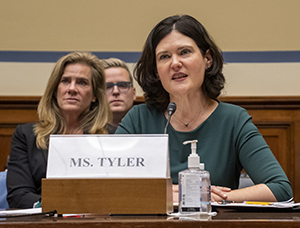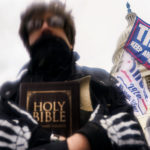Christian nationalism “provides cover” for white supremacy by offering racists a veneer of respectability, Amanda Tyler, executive director of the Baptist Joint Committee for Religious Liberty, told a Congressional hearing.
“Understanding Christian nationalism is imperative to both dismantling white supremacy and preserving religious freedom for all,” Tyler said.
Christian nationalist ideology represents “a gross distortion of the Christian faith” that seeks “to merge American and Christian identity,” she explained to members of the House Oversight Subcommittee on Civil Rights and Civil Liberties.
“The ‘Christian’ in Christian nationalism is more about ethno-national identity than about religion,” Tyler told a Dec. 13 hearing on “Confronting White Supremacy: The Evolution of Anti-democratic Extremist Groups and the Ongoing Threat to Democracy.”

“Christian nationalism uses the language, symbols and imagery of Christianity—in fact, it may look and sound like Christianity to the casual observer. However, closer examination reveals that it uses the veneer of Christianity to point not to Jesus the Christ but to a political figure, party or ideology,” she said.
“Christian nationalism often overlaps with and provides cover for white supremacy and racial subjugation. It creates and perpetuates a sense of cultural belonging that is limited to certain people associated with the founding of the United States, namely native-born white Christians.”
Tyler took issue with what she called “the Christian nation myth” that ignores people of color and religious minorities in favor of “the false narrative that the U.S. is special because it was founded by and for white Christians.”
The “myth of a Christian nation” and the merging of Christian and American identity directly contradict Article VI of the U.S. Constitution, which prohibits religious tests for public office, she noted.
Concern about attacks on houses of worship
“As a Baptist, I became a leader in the fight against Christian nationalism because of my increasing alarm about the violence it has inspired at our country’s houses of worship,” Tyler said.
Sign up for our weekly edition and get all our headlines in your inbox on Thursdays
She pointed to attacks on Mother Emanuel AME Church in Charleston, S.C.; Tree of Life Synagogue in Pittsburgh; Pa.; and Chabad of Poway near San Diego, Calif.
She also noted how “Christian nationalism inspired white supremacist violence in public spaces,” such as the attack on Tops Supermarket in Buffalo, N.Y.
“Christian nationalism helped fuel the attack on the U.S. Capitol on Jan. 6, uniting disparate actors and infusing their political cause with religious fervor,” she added.
Tyler urged members of the Congressional committee to reject the notion that confronting Christian nationalism is anti-Christian.
“All across this country, Christians are deeply alarmed by this [Christian Nationalist] ideology—especially the way it gives an illusion of respectability to white supremacy and undermines our nation’s foundational commitment to ensure religious freedom for all,” she said.
Rep. Jamie Raskin, chair of the House Committee on Oversight and Reform, asked Tyler why Baptists historically have championed religious freedom.
“It really goes back to the beginning of the Baptist movement in the early 17th century and Thomas Helwys, who wrote the first defense of universal religious freedom in the English language and was imprisoned by King James I for his advocacy,” she explained.
From Helwys to Roger Williams, founding pastor of the First Baptist Church of Providence, R.I., to the BJC, the common thread is a “theological commitment to soul freedom and our living out of Jesus’ command to love our neighbor as ourselves,” she said.
“We protect the religious freedom of our neighbors as we protect our own religious freedom,” she said. “And we do it in our constitutional democracy by defending the First Amendment.”













We seek to connect God’s story and God’s people around the world. To learn more about God’s story, click here.
Send comments and feedback to Eric Black, our editor. For comments to be published, please specify “letter to the editor.” Maximum length for publication is 300 words.